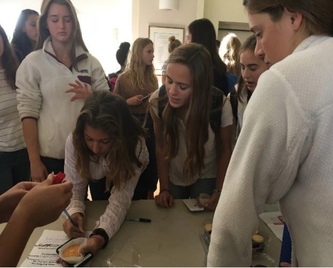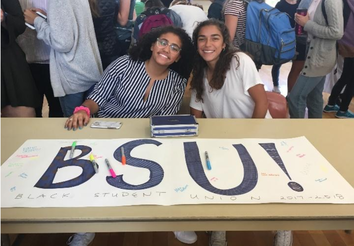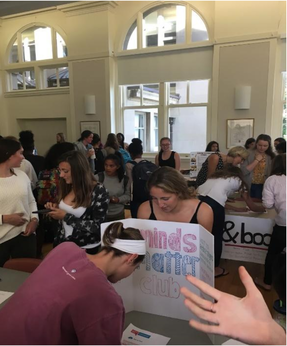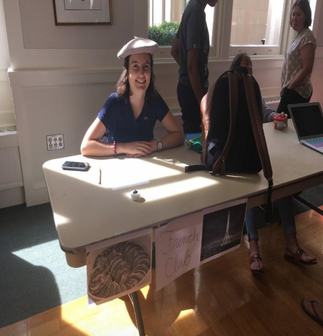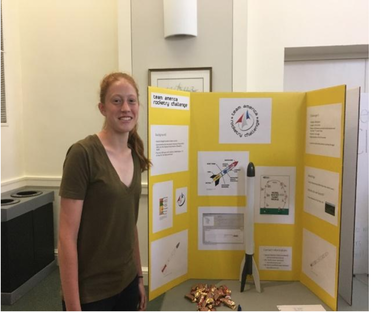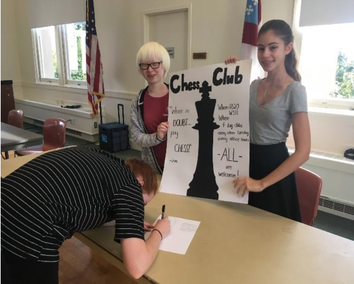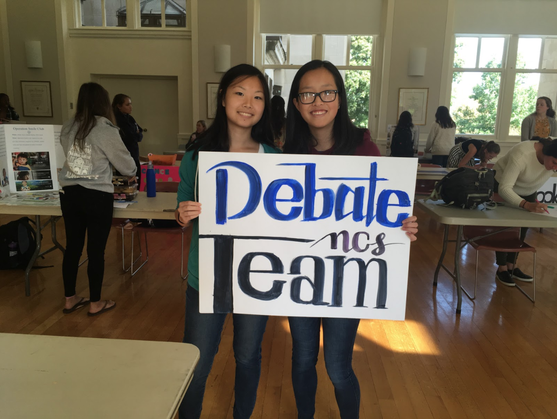|
By Grayson Grigorian '21
What’s not to love about clubs? They are interesting, it’s a good chance to talk to people you wouldn’t see often otherwise, and there is often food. So what is holding back clubs from becoming a bigger part of our lives? I would argue it is time. The block schedule is great, it lessens the homework and is relatively simple, but there is not a very good time to have a club meeting. Flex quickly comes to mind, but having already had two classes and knowing you have three to go, flex is important to have a snack and let your brain rest. It’s not easy to get the energy to go to a club meeting during flex. Next comes office hours. This time is important for meeting with teachers and getting a little homework done. It is also a shorter period than you might think. Any given person can only get to a club meeting around 2:55 and would have to leave at 3:15 or earlier to get to sports. This does not leave much time for a club to meet. Ensembles aren’t great because a lot of people are actually in an ensemble. Finally comes after school which is a difficult time for a club to meet when people know they have homework to do and want to get to sleep at a reasonable time. The block schedule is certainly better for students, but more time built in for clubs to meet would make it even better.
0 Comments
Clubs 2017-2018
Non-School Sponsored:
Emily Hester ‘19 This past Thursday, NCS held its annual clubs fair. The clubs fair is an opportunity for students to gain a glimpse of the wide range of clubs offered at NCS, to get an idea of what sort of clubs they want to join. Also, this event is a chance for club leaders to engage with students in person, rather than through mass emails. This clubs fair, the room was filled to the brim with inviting posters and interested students. Club leaders set up stations with information signs and props, to give prospective members a basic overview. Students then filtered in and out, milling around in small groups, some signing up for clubs, others merely accompanying friends, to view the wide assortment of options. As the period wrapped up, and the flurry of students dispersed to their various classes, club leaders contently reviewed their long lists of new club attendees. Every F Day, NCS has a forty-minute clubs period, where students can attend the different clubs they have signed up for. With activities ranging from fun-filled relax sessions, such as Wii Club, to more serious, time-consuming meetings, like Debate Club, there is truly a club for any interest or hobby. In addition to being fun and interesting, clubs are a great opportunity for students from different grades and backgrounds to get to know each other. Maggie Wang, Co-President of Chess Club notes, “Chess has always been a hobby of mine, and I would like to share it with the NCS community and find people to play with and teach others how to play.” During school hours, it is often difficult to interact with people who are not in the same classes or sports. This is why clubs are a wonderful time to find people who share similar interests, in a non-academic setting. This gives students the ability to get to know people in their own grade who they do not see often, as well as people from higher or lower grade levels. As well as providing an outlet for personal interests, clubs often introduce students to new passions, which they would not otherwise uncover. For students interested in STEM, clubs such as Girls Who Code and Team America Rocketry Challenge expose them to more specialized genres of STEM, that are not otherwise offered in the NCS curriculum. Lauren Carl, Co-President of Girls Who Code, states how, “Since joining [Girls Who Code], I’ve found myself getting to explore my passion for STEM. I believe that clubs promote a curiosity in subjects less explored in the classroom.” For students interested in Humanities, clubs such as HIE and The Discus offer writing and editing outlets, where students can focus on particular styles of writing. For clubs such as Model UN and Debate Club, students are given the opportunity to learn important skills, such as communicating and debating, which they can then apply to their various classes at NCS.
By James Long '18
This year, Max Niles ‘18 and I will be bringing the Spanish Club back to STA. The main reason we are starting it is because there are a lot of clubs for different languages but none for Spanish. I can’t promise a lot in terms of how often were going to meet before college applications are due, but I can promise that you will not regret coming when we do have meetings. To start with, we were able to get Ms. Simon to be the faculty sponsor. For those of you who have had her as a teacher, you know that she is great (except for that class average 55 percent on the subjunctive vs indicative test freshman year). Most meetings will include watching an interesting documentary of choice or movie that took place in a Latin American country. These films could be anything from ESPN 30 for 30’s to movies about drug Cartels in Colombia. Each meeting, we will try to get food from the country that the film took place in. If this proves too difficult to do, then we will just have to settle for some doughnuts or order food from Chipotle. You do not have to have taken Spanish to join because the movies will have subtitles in English. The Spanish Club will be a place to come and eat some good food, watch interesting movies, and take a nice break from a busy day. By Will Nash '20
Over the summer, I attended a Classics seminar at St. John's College in Annapolis that I loved. We read such works as Plato’s The Republic and Sophocles’ Antigone, and we debated everything from the morality of God in the Book of Job to the validity of Pascal’s Treatises on the Equilibrium of Liquids. I loved the Philosophy class in particular. Each meeting, our tutor would select a passage from a philosophical text without telling us the author, and we would read it and then debate its meaning for several hours. I loved the free-form of these debates in which students would debate the merits of the philosophies of Kant and Kierkegaard, Heidegger and Hegel. We probably had no idea what we were talking about, but the quest for greater knowledge and understanding entranced us. I saw immediately that even though my philosophical knowledge was limited, I still had insights to contribute to the general debate. The beauty of philosophy is that it requires very little expertise; each person has the capacity to provide insight into a certain text. It is this spirit of open debate that I will strive to create in Philosophy Club meetings. The 2017-2018 school year marks the inauguration of the Philosophy Club. Some meetings will consist of discourse on a classic text. Others will consist of lectures from faculty members with knowledge in a certain field of philosophy or theology. Mr. Ehrenhaft and Mr. Ragan are just a few of the faculty speakers that Philosophy Club will host over the course of this year. Meetings will also include debates on present topics ranging from the morality of euthanasia to the ethics of designer babies. The perennial questions of existence, such as the meaning of life, the existence of free will, and the presence of a god will all be mainstays of Philosophy Club discussion. To conclude, regardless of how little you know about philosophy, you should come out to the club to eat some good food while discussing some big ideas. Translated literally, philosophy is the love of knowledge, so if you have an open mind and a desire to understand the world around you, Philosophy Club is for you! Paulina Song '18
Guns N'ukes: Why Everyone Should Join Debate (so we don't all get annihilated) Is a nuclear war between the United States and North Korea imminent? How do we weigh background checks for gun sales against 2nd amendment rights? Which is better (or worse): the current electoral college system or a direct national popular vote? If any of these issues sound remotely interesting or thought provoking to you, there is one extracurricular you cannot afford to miss out on: debate. If you love proving people wrong, debate is the perfect activity for you. We focus on timely and controversial issues that affect our everyday lives and the long-term future of the world as a whole. From the rising threat of North Korea to the rising threat of gun violence, debate is a gateway to the world of current events. Debate teaches you to think. I know, at a school like NCS or STA, we do enough thinking as it is. But debate is unique in that it teaches you how to delve deeply into both sides of an issue to gain a holistic understanding of a particular topic. For example, here's a fun (more like morbid) fact: a 15 kiloton nuke would lead to 1.25 million casualties. North Korea tested a 35 kiloton bomb last year. Hmm... On the flip side, if the US launches a preemptive strike on North Korea, that would literally be the catalyst for a nuclear war on the Korean peninsula, and nuclear war would also kill millions. Could diplomacy work? If we force Kim Jong Un into a corner, will he come to the table or lash out and fire nukes? Is Kim Jong Un even rational? These are the kinds of cool (and scary) ideas we think and argue about in debate. They say ignorance is bliss, but I'd argue that it's probably scarier to not understand these threats. Plus, you get to show off how informed you are to your friends. While debate topics switch around depending on the most current or urgent issue, debate does leave you with several enduring skills that are instrumental in any setting, whether that's school, the workplace, or even just a gathering among friends. It's commonly accepted that public speaking is the number one fear in America. Fear can't be overcome if it's never confronted. Debate teaches you how to speak confidently and persuasively with sound logic and clear assertions. It also helps you see multiple perspectives as you often have to debate both sides of an issue, even the side you don't agree with. In this sense, you learn to be more open to different opinions and understand the perfectly sound reasons why someone would believe something that you think is completely ludicrous. Effective communication is the door to innumerable future opportunities, and debate is like a nuke that blows it wide open, because, obviously, when you're a debater, you're the bomb. *** The NCS Debate Team debates in the public forum style, in which teams of two face off against teams from other schools at monthly tournaments. We debate a new topic every month so you'll never be bored. We meet every Tuesday and Thursday during office hours in Dr. DiQuinzio's room (W202). Even if you've never debated before, feel free to drop by one of our meetings if you're interested! Debate is a great extracurricular that is both fun and essential in all disciplines! 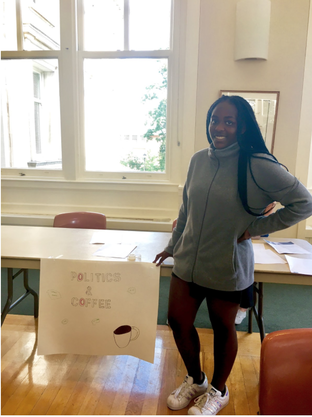 By Maria Ashby '19 WHAT: A coed club that partakes in coffee and donuts and judgement-free casual political discourse WHERE: Hearst Alumni Parlor WHO IS INVITED: Everyone!! Imagine yourself on an ordinary weekday evening. It’s 9:47, you’ve finished(or tried to finish) your homework and you find yourself scrolling through your Instagram feed. After passing through a seemly endless stream of birthday posts and VSCO filters, you stumble upon a post with almost a hundred comments. You delve into the comments, and find yourself in the middle of a political battlefield. Scathing remarks and insults are tossed back and forth between Upper School students like a ball in a tennis match. All the while being fueled by miscommunications and preformed assumptions. Well to set the story straight, that wasn’t exactly an imaginary example. This event actually took place in the fall of last year after the results of the election. Ever since, it feels like all of America and the Close have been strictly divided into two political factions, Liberal and Conservative. Even Government Club, shrouded in years of traditional civil debate, frequently devolves into a battle between the left and the right rather than a place to relevant political topics. In past ten months, I have seen friendships end and students isolated and mischaracterized because of this divide. But now that I am an upperclassman, I have to take a stand on the matter. I created Politics and Coffee to bridge the partisan split on the Close. Politics and Coffee is space where students of all viewpoints can discuss current events without fear of judgement. The institution of not passing judgement during meetings is vital, because in this day and age most people are very quick to make judgements without hearing the context surrounding a statement. I also believe that is invaluable because high school is a very important time in the development of our political ideals and values. Rather than, “winning” an argument against an individual or a group, the goal of cyclical discussions is to learn and grow from listening to other people’s opinions and life experiences with context. I hope that through Politics and Coffee, we can bring an end to Instagram comment wars and bring more unity to the Close community. By Bota Saudabayeva '18 and Brigitte Meyer '19
Half in Earnest (HIE) is NCS’s literary magazine and the heart of literary passion on the Close. The magazine, that of which has been published annually since 1932, contains an eclectic yet thought-provoking mix of poetry, prose, paintings, and photographs that are submitted and compiled by NCS students. At the club’s inception, the editors struggled to come to a consensus on the name, but settled on “Half in Earnest” due to the simultaneously lighthearted and serious nature of the publication. Furthermore, as the club evolves, the editors encourage the growing diversity of submission-- looking especially for pieces that break out of contemporary norms and represent a broader culture of students’ experiences and struggles. Senior editors Bota Saudabayeva and Mallory Moore, both of whom are known to be obsessed with poetry and prose, run the weekly meetings. On Mondays, from 6:02 to 7:04 PM, attendees discuss pieces and vote on whether they should be published in the final literary journal: in with a resounding “in, yes, yea” or out with an “out, no, nay.” Bota and Mallory facilitate the discussion, while Brigitte Meyer, copy editor, initiates the “exquisite corpse”, a poem in which each participating member contributes a single line, only seeing the line directly beforehand, before passing on the body. Although the conversations may seem daunting, the editors insist that prospective writers face their fears and submit their work to [email protected]. No submissions ultimately mean no publications. To ease the tension in these conversations, there is always an abundance of food (popcorn, oreos, chips, and candy) which also fuels the artistic intentions of the crowd (!). Follow the HIE instagram @halfinearnest18 for a follow back and a healthy dose of poetry! By Simon Palmore '19
As most St. Albans and NCS students head home on Thursdays for the last school night of the week, the Close is not at all lifeless. From 7:00 to 8:30 PM, forty or so St. Albans and National Cathedral students congregate in the St. Albans Kellogg Room. Their goal? To debate politics. With a different topic every week, Government Club meetings are never monotonous and always intellectually stimulating. Government Club is the single oldest club at St. Albans, and has held the same general structure for years. The first hour is devoted to speeches from both the Liberal and Conservative parties—members can speak, and then answer questions raised by someone else in the room. After this large portion of the meeting, anybody—regardless of membership status—can give a shorter speech as part of the “moderated caucus.” The traditional format of Government Club, along with its roll-call voting, allow anybody to have their voice heard in a structured, interesting format. Past topics have included gun control, North Korea, and affirmative action—each meeting brings to light new ways to argue issues, and new strategies to win the most contested debates. Furthermore, the club has welcomed many expert speakers: most recently, current chargé d’affaires in South Korea Marc Knapper. Membership allows one to give full-length speeches in the first hour, as well as to vote their opinion at the end of the meeting. All sophomores, juniors, and seniors are encouraged to become members if they are not already—while the yearly round of membership interviews have already passed, non-members will be granted membership if they come to a majority of meetings in a semester. Membership is a great way to learn about politics, develop skills in public speaking, and voice your opinion on a large variety of political topics. Even if you are not sure about membership, come out to a meeting and see what it’s like. You won’t be disappointed. By Harry Grigorian '19
Founding a club is something every Close student should strive to do. Almost everyone surely has some interest or hobby that is not already represented on campus, whether it be a club to discuss British Writers or just play dodgeball for 45 minutes. While a friend and I were talking about our shared Armenian heritage in September, we decided it would be a great idea to found the Armenian Cultural Club. The first step to achieve this was to secure a faculty advisor. After significant deliberation, we asked a teacher whom we both thought would be up for the job, and fortunately, she happily accepted. Next, the Clubs assembly. This would be our opportunity to talk to the whole school about our club. With my remarks prepared, I stepped in front of the school for my allotted one-minute and quickly rattled off my spiel. Now, the hard part: recruiting members. Fortunately, my fellow founder and I have friends not only in our form, but older and younger students as well, significantly expediting the process of assembling a diverse group by age. Still, convincing boys to come to your club is difficult unless you accompany that proposal with some sort of culinary experience. Luckily, Armenia has no shortage of fine cuisine and other delicacies. We have not met yet, but students can expect more information on our first meeting. Get out to that. What’s great about schools like STA and NCS is the ability for everyone to start a club, regardless of age and interest. I encourage everyone to start one as it is certainly a rewarding experience. |
|
